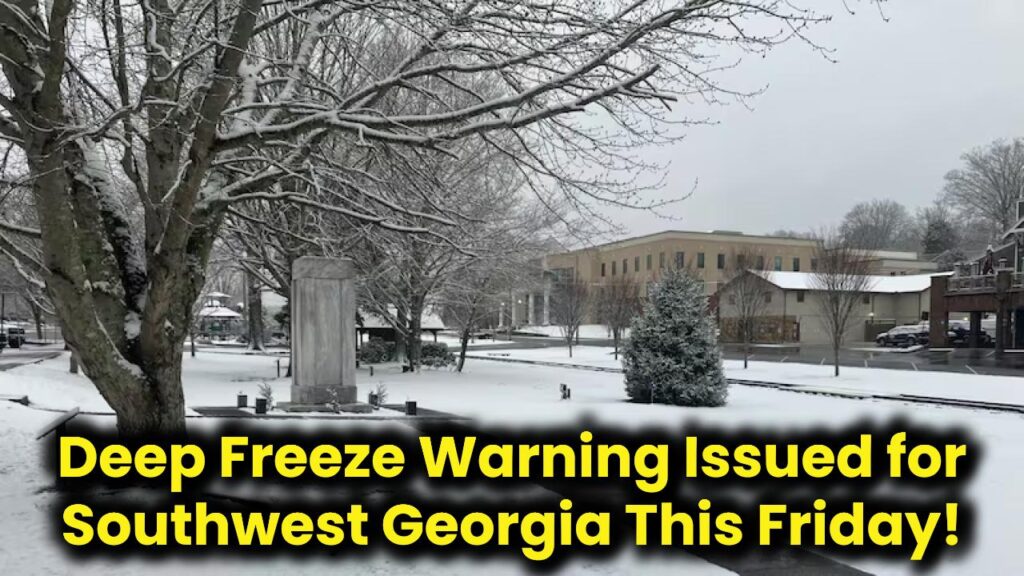
The National Weather Service (NWS) has issued a Deep Freeze Warning for Southwest Georgia this Friday, bringing dangerously cold temperatures to the region. Residents should prepare for sub-freezing temperatures, icy conditions, and potential power outages. This guide will help you understand the impact of this cold wave and how to protect yourself, your family, pets, and property.
URGENT ALERT
| Key Facts | Details |
|---|---|
| Affected Areas | Southwest Georgia, including Albany, Thomasville, Valdosta |
| Expected Low Temperatures | 20-25°F (-6 to -4°C) |
| Wind Chill Factor | Feels like 10-15°F (-12 to -9°C) |
| Main Concerns | Hypothermia, frostbite, frozen pipes, power outages |
| Safety Tips | Layered clothing, heating safety, pet care, emergency kits |
| More Information | National Weather Service |
The Deep Freeze Warning for Southwest Georgia requires serious preparation to ensure safety and minimize risks. By dressing appropriately, winterizing your home, protecting pets, and avoiding unnecessary travel, you can stay safe and comfortable throughout the cold snap. Stay updated with the latest weather alerts from the National Weather Service.
What to Expect During the Deep Freeze?
Understanding the Warning
A Deep Freeze Warning means that temperatures will drop below freezing for an extended period, posing significant risks to health, infrastructure, and transportation. This occurs when arctic air masses push south, causing bitter cold conditions uncommon for the region.
Who is Most at Risk?
- Young children & the elderly (higher risk of hypothermia)
- People with chronic illnesses (cold stress may worsen conditions)
- Outdoor workers & the homeless (long exposure can lead to frostbite)
- Pet owners (domestic animals can suffer in extreme cold)
How to Stay Safe During a Deep Freeze
1. Protect Yourself & Your Family
Dress Warmly
- Wear multiple layers (thermal base layer, insulating middle, waterproof outer layer)
- Cover extremities (gloves, hats, thermal socks, insulated boots)
- Use scarves & face masks to protect against frostbite
Stay Indoors & Keep Warm
- Keep your home at at least 68°F (20°C)
- Close curtains and windows to prevent heat loss
- Use space heaters safely (keep 3 feet away from flammable materials)
- Never use gas stoves or ovens for heating (carbon monoxide risk)
2. Winterize Your Home
Prevent Frozen Pipes
- Let faucets drip slightly to prevent freezing
- Insulate exposed pipes (foam insulation or towels)
- Keep cabinet doors open to allow warm air circulation
Prepare for Power Outages
- Charge phones & backup batteries
- Have flashlights, candles, and extra blankets
- Stock up on non-perishable food & bottled water
- Keep gas tanks full in case you need to evacuate
3. Take Care of Pets & Livestock
- Bring pets indoors or provide insulated shelters
- Ensure fresh, unfrozen water is available
- Increase feed for outdoor animals to maintain body heat
4. Travel Safety Precautions
- Avoid driving unless necessary
- Keep emergency supplies in your car (blankets, food, water, flashlight, first aid kit)
- Drive slowly and watch for black ice
- Ensure tires are properly inflated & in good condition
5. Emergency Preparedness Checklist
To stay prepared, have these essentials on hand:
- Emergency contact numbers
- First aid kit & medications
- Batteries & power banks
- Warm clothing & extra blankets
- Bottled water (1 gallon per person per day)
- Ready-to-eat food & non-perishable items
- Hand & foot warmers
6. Community Support and Resources
- Check for local warming centers or emergency shelters
- Volunteer or donate supplies to homeless shelters
- Stay informed through local news & weather updates
FAQs On URGENT ALERT
1. How long will the deep freeze last?
The current forecast indicates the coldest temperatures will occur between Thursday night and Saturday morning, with gradual warming by Sunday.
2. Can I still use my fireplace or space heater?
Yes, but follow safety guidelines: keep space heaters away from flammable materials, never leave them unattended, and ensure proper ventilation when using fireplaces.
3. What should I do if my pipes freeze?
Turn off the main water supply, apply gentle heat (hairdryer, warm towels), and avoid using open flames or boiling water to thaw pipes.
4. Are schools and businesses closing due to the cold?
Check with local authorities and school districts for closures and schedule changes.
5. How can I help the homeless during the freeze?
Donate blankets, warm clothing, and non-perishable food to local shelters. If you see someone in distress, contact local emergency services.







